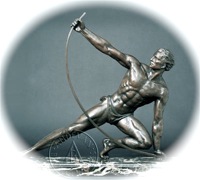Difference between revisions of "Virility"
m (Text replacement - "http://nordan.daynal.org" to "https://nordan.daynal.org") |
m (Text replacement - "http://" to "https://") |
||
| Line 3: | Line 3: | ||
==Etymology== | ==Etymology== | ||
Middle French or [[Latin]]; Middle French viril, from Latin virilis, from vir man, male; akin to [https://nordan.daynal.org/wiki/index.php?title=English#ca._600-1100.09THE_OLD_ENGLISH.2C_OR_ANGLO-SAXON_PERIOD Old English] & Old High German wer man, [[Sanskrit]] vīra | Middle French or [[Latin]]; Middle French viril, from Latin virilis, from vir man, male; akin to [https://nordan.daynal.org/wiki/index.php?title=English#ca._600-1100.09THE_OLD_ENGLISH.2C_OR_ANGLO-SAXON_PERIOD Old English] & Old High German wer man, [[Sanskrit]] vīra | ||
| − | *Date: [ | + | *Date: [https://www.wikipedia.org/wiki/15th_Century 15th century] |
==Definitions== | ==Definitions== | ||
*1 : having the [[nature]], properties, or [[qualities]] of an adult [[male]]; specifically : capable of [[functioning]] as a male in [[copulation]] | *1 : having the [[nature]], properties, or [[qualities]] of an adult [[male]]; specifically : capable of [[functioning]] as a male in [[copulation]] | ||
| Line 14: | Line 14: | ||
Historically, [[masculine]] attributes such as beard growth have been seen as signs of virility and [[leadership]]. (for example in ancient Egypt and Greece) | Historically, [[masculine]] attributes such as beard growth have been seen as signs of virility and [[leadership]]. (for example in ancient Egypt and Greece) | ||
| − | As a term for positive [[reference]], virility does not accord with [ | + | As a term for positive [[reference]], virility does not accord with [https://en.wikipedia.org/wiki/Feminism feminisms] that put forward various [https://en.wikipedia.org/wiki/Deconstruction deconstructions] of [[masculinity]]. According to these [[points of view]], virility is redefined as an outdated [[abstraction]], impacting negatively on [[women]] via unwanted [[sexual]] activity, and unwanted pregnancies. |
[[Category: General Reference]] | [[Category: General Reference]] | ||
Latest revision as of 02:42, 13 December 2020
Etymology
Middle French or Latin; Middle French viril, from Latin virilis, from vir man, male; akin to Old English & Old High German wer man, Sanskrit vīra
- Date: 15th century
Definitions
- 1 : having the nature, properties, or qualities of an adult male; specifically : capable of functioning as a male in copulation
- 2 : energetic, vigorous
- 3 a : characteristic of or associated with men : masculine
- b : having traditionally masculine traits especially to a marked degree
- 4 : masterful, forceful
Description
Virility refers to any of a wide range of masculine characteristics viewed positively. It is not applicable to women or to negative characteristics. The Oxford English Dictionary (OED1) says virile is "marked by strength or force." Virility is commonly associated with vigour, health, sturdiness, and constitution, especially in the fathering of children. In this last sense, virility is to men as fertility is to women. OED1 also notes that virile has become obsolete in referring to a "nubile" young woman — "a maide that is Mariageable or ripe for a Husband, or Virill." Historically, masculine attributes such as beard growth have been seen as signs of virility and leadership. (for example in ancient Egypt and Greece)
As a term for positive reference, virility does not accord with feminisms that put forward various deconstructions of masculinity. According to these points of view, virility is redefined as an outdated abstraction, impacting negatively on women via unwanted sexual activity, and unwanted pregnancies.
